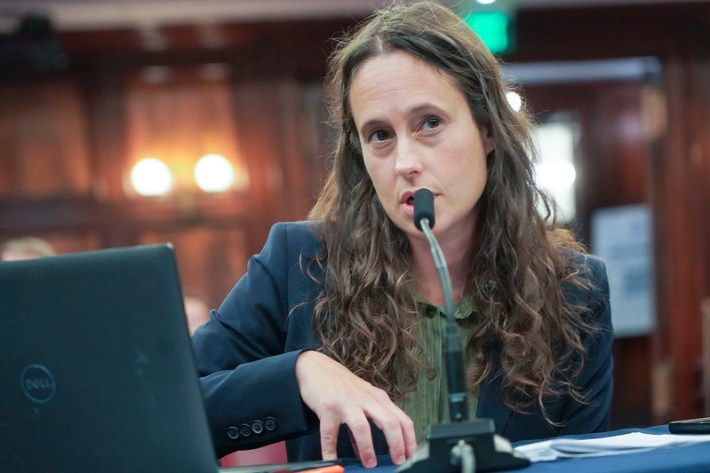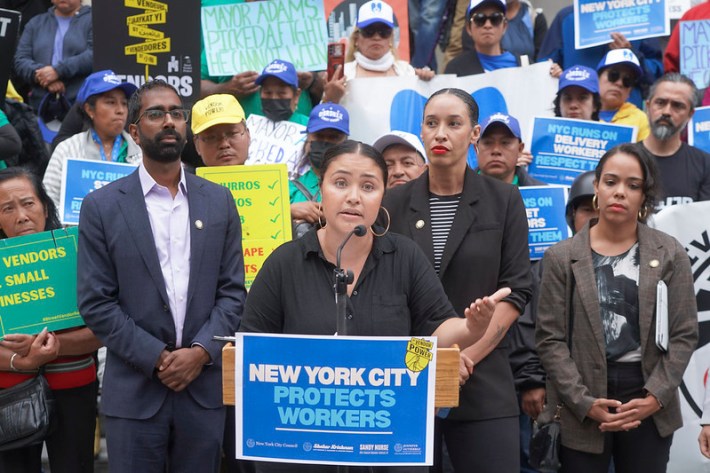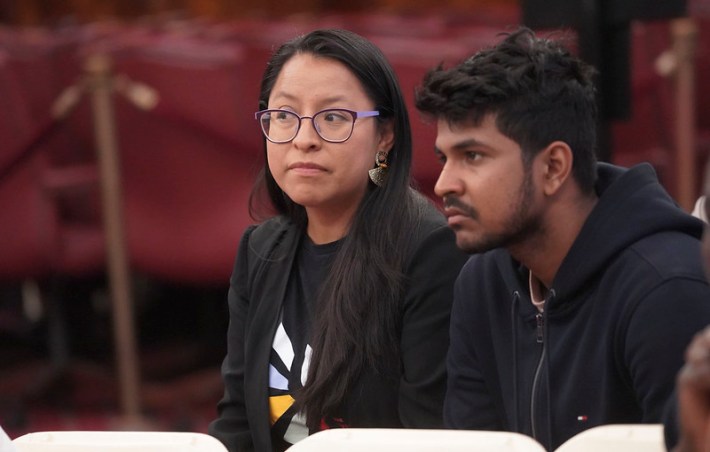Protect delivery workers? It's a race to the bottom.
The Department of Consumer and Worker Protection, which oversees the 80,000-worker delivery industry, says it needs funding for 20 new employees to properly regulate app giants and ensure they pay the city-mandated minimum wage — but the Adams administration only allocated funding for four positions ... and then allocated even less during final budget negotiations with the Council.
The shortfall has left the agency struggling to respond to worker abuse complaints — and to now sound the alarm against its own mayor, though not in so many words.
“We urgently need new resources to implement the minimum pay rate for the broader delivery workforce,” Deputy Commissioner Elizabeth Wagoner testified at a recent Council hearing. “It is very important — to actually realize the minimum pay rate — to be appropriately staffed for it.”
The department had asked for the 20 new employees during preliminary budget hearings, but the budget left the agency hanging, part of a pattern of the mayor and Council neglecting the workers' rights department.

That short-shift started with the mayor’s executive budget, released in May, which proposed a total DCWP budget of $75.1 million (the final adopted budget decreased that amount by around $56,000). As a result, the agency's budget comprises roughly 0.06 percent of the city’s $115.9-billion budget.
As a result, the agency testified it lacks the funds to uphold existing laws, nor take on enforcement associated with pending legislation to regulate the app industry — bills supported by experts, workers, and DCWP.
What's going on?
The tension started earlier this summer when the mayor vetoed the two pay expansion bills, Council Member Jennifer Gutierrez's Intro 1133 and Council Member Sandy Nurse's Intro 1135.
The bill by Gutierrez (D-Bushwick) will expand the minimum pay law to include all contracted delivery employees, while the bill by Nurse (D-East New York) will expand the minimum wage to include grocery delivery apps, thereby closing the “Instacart Loophole.”

The Council overrode both vetoes — and, in doing so, aligned itself closer to a mayoral agency and the workers it supports, than the mayor, who sided with Instacart after that company's expensive lobbying campaign.
“I just want to shout out DCWP,” Gutierrez said at a rally celebrating the override vote earlier this month. “They have been working tirelessly with us, the commissioner, and the whole team. And it is unfortunate that their mayor is opposing them at this point and working against them.”
Passing bills is one thing, but implementation is difficult when agencies lack funding. At one point this year, the City Council, which also voted to approve the adopted budget, estimated that DCWP would need around $2.9 million to implement the new minimum pay legislation, a drop in the virtually empty bucket at the agency.
And it's community organizations that have to pick up the slack.
With the override votes, "the agency has to enforce a minimum pay standard for 20,000 more deliveristas without any additional capacity," said Ligia Guallpa, the executive director of Worker's Justice Project. "I know that DCWP has all the intention to do that, but they don't have the resources."
Small but mighty
The tiny Department of Consumer and Worker Protection is tasked with protecting the city’s consumers and its workers, all while conducting inspections and enforcing workplace rules and regulations.
In 2019, under then-Mayor Bill de Blasio, the agency, then known as the Department of Consumer Affairs expanded and was renamed to ensure the growing population of so-called for-hire workers is not mistreated.
Last year was the first full year that the department implemented the original minimum pay law for restaurant app workers — and wages rose by $700 million collectively. But workers consistently testify that the app companies are not complying fully with the law, not respecting trip distances workers set, or withholding tips and wages.
“[The apps] play with the workers and don’t respect laws. That’s why we need to keep pushing,” said Gustavo Ajiche, the founder of Los Deliveristas Unidos.
When app companies don’t follow the law, DCWP is tasked with addressing these complaints and getting them resolved. But the lack of staffing can be a roadblock, according to budget reports and organizations who help workers file complaints.
And complaints are rising: Between July and September last year, the agency received 312 complaints. In the same period this year, it received 408 — an increase of 31 percent. The onslaught made it more difficult for the agency to function, with completed investigations dropping from 167 to 138 — a decrease of 17 percent.
And the investigations that did get completed took longer; the median time to assess complaints tripled from 28 to 72 days.

"The enforcement crisis that workers are facing is due to the fact that sole agency that thousands of workers rely on to investigate labor complaints for labor protections ... is the agency that has the smallest staff, the smallest capacity to respond," said Guallpa. "We're hoping that the next mayor [will] fully fund [DCWP]."
Pulling bootstraps
Community groups and advocates, who are low on resources themselves, have been forced to fill the gaps.
For instance, the DCWP recently secured a $200,000 settlement from Relay, which Guallpa called one of the "most predatory" delivery apps. But the settlement never would have happened without the Worker's Justice Project and Los Deliveristas Unidos getting 280 workers to come forward with complaints.
That's why Guallpa wants to see a "co-enforcement" model, which acknowledges the role that community groups are already playing and allocates funding for them as well.
"We help [workers] file the complaints, help them build trust as well between the worker and the agency, especially ... when we have a mayor who has made it clear that he's collaborating with Trump," said Guallpa.
Potential new leadership
Mayoral frontrunner, Assembly Member Zohran Mamdani, says he will double the DCWP budget if elected.
“DCWP currently spends $65 million, while returning significant money to the wallets of working-class New Yorkers, and to the city budget, through restitution and civil penalties,” his website reads. "Doubling the DCWP budget and hiring more staff will allow the department to enforce the non-compete ban, fight wage theft, prevent and enforce misclassification, and generally root out labor abuse."
A spokesperson for City Hall — not the mayor's campaign, which declined to comment — told Streetsblog that the mayor did oppose the most recent bills to regulate the app industry, but intends to follow the law and funding could still be moved to help the agency.
"City agencies routinely highlight financial impacts during City Council hearings ... as we prepare for Intros 1133 and 1135 to take effect next year, we will review the bill and assess our financial needs," Stephany Vasquez Sanchez said in a statement.
The campaign teams of Curtis Sliwa, and Andrew Cuomo – who are all vying for the city’s top job – declined to comment.






